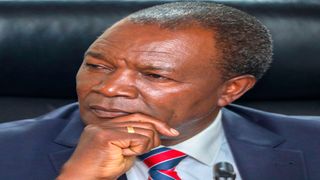
National Treasury Cabinet Secretary Njuguna Ndung'u.
| File I Nation Media GroupOur Columnists
Premium
Why privatisation plan stinks
Is Uganda about to ditch Mombasa by re-routing its oil imports through the Port of Dar es Salaam? Initially, the signals were that Kampala was about to dump us. But indications now are that our biggest trading partner by value and volume is still keen on using the Northern Transport Corridor. Kenya Pipeline and the Mombasa port are not about to lose significant transit business.
Some background: The Ugandan market consumes 20 per cent of refined petroleum imports through the Port of Mombasa. The oil is then transported by pipeline through Kenya into Kampala, either by road through Eldoret or lake vessels plying Lake Victoria, through Kisumu.
Even more significant, importation of refined petroleum products by Uganda is traditionally done through international oil marketing companies under the open tender system (ORS) and, lately, since March, the so-called Government-to-Government (G-to-G) arrangement.
The other day, President Yoweri Museveni announced that Uganda would henceforth import its oil independently, outside the traditional arrangement, and no longer rely on either Kenya’s OTS or the G-to-G arrangement. And, instead of relying on Nairobi-based international oil companies to import oil for them, their imports would henceforth be conducted by the Uganda National Oil Corporation (UNOC). UNOC then gave notice that it planned to import its first cargo outside the Kenyan system in January.
However, it seems that, after doing the math, the Ugandans have come to the conclusion that it still makes sense for them to route their oil via Mombasa, through the Kenya Pipeline Company (KPC) system. I gather that UNOC has now made a request to the government seeking to be accommodated within the Kenyan pipeline system.
I am informed that the government has, consequently, directed both the Energy and Petroleum Regulatory Authority (Epra) and KPC to urgently issue an oil import licence to UNOC. They have also been directed to urgently make the logistical arrangements to allow seamless integration of UNOC’s imports plan into the Kenya vessel scheduling process to avoid unnecessary delay at the Port of Mombasa.
What are the lessons for us from these developments? We must remember that the Uganda’s decision to continue business with us is not because they love us. As argued in this column before, our neighbours are permanently engaged in a cloak-and-dagger game with us over economic dominance.
Economic dominance
Three years ago, Kampala decided to route their oil pipeline through Tanzania. We also saw Kigali deciding to develop a rail link through Dar instead of Mombasa. The point here is this: In the context of the battle for economic dominance with our neighbours, what will give us the competitive advantage is the investment we make in developing and improving transboundary infrastructure? There are the major transport corridors, seaports, water way links and networks of inland container terminals.
The trends seem to suggest that we are beginning to cede the lead to our neighbours in a number of areas, especially in manufacturing. Our neighbours are fighting hard to replicate some of the things we have done to maintain our competitive advantage over them.
Which is why I find the idea of privatising an asset so critical to entrenching our pre-eminence as the dominant economy in the region, such as KPC, to be horrendous, short-sighted and foolish.
Granted, it is normal that a cash-strapped government would want to unlock value from a mature asset like KPC by floating shares on the Nairobi Securities Exchange. Indeed, KPC is among the few state corporations with the profit profile to past the test of being listed.
But does it make economic sense? You end up with shareholders who cannot contribute money whenever there is a capital call? KenGen is touted as an example of a successful privatisation. We sold 30 per cent of the company to the public.
Yet this privatisation has only benefitted the private parties,who own the 30 per cent float by allowing them to squat on public assets and earn handsome dividends at the expense of the taxpayer, who continues to bear the cost of servicing billions of government- guaranteed loans borrowed on KenGen’s behalf to construct power stations and drill geothermal wells.
If you look at the external public debt register, you will see that we borrowed billions of shillings from China and Japan to drill KenGen’s geothermal wells and put up the power stations. In 2017, KenGen was forced to sell untaken rights issues worth billions of shillings to a South African pension fund. Today, the top 10 shareholding is in the hands of entities whose ultimate beneficial ownership are concealed in nominee accounts, private equity, pension funds- and in some cases—businesses based in tax havens.
Neither is the option of privatising KPC through concession feasible. The government should drop the company from the list of companies to be privatised.





